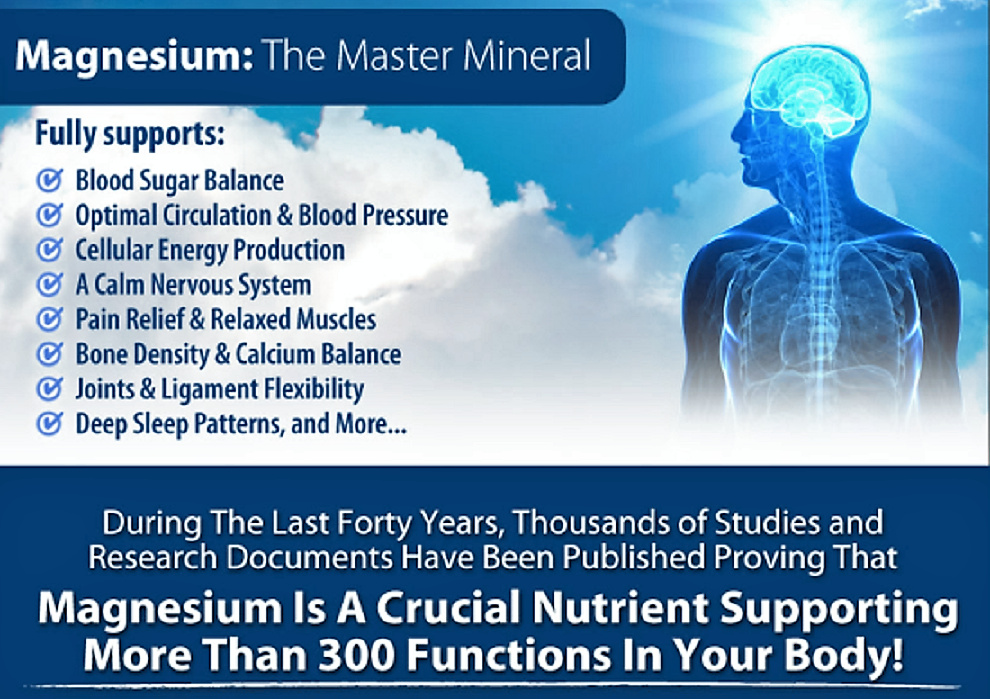Educating and Empowering You to Heal, Thrive, and Live a Happy, Healthy Lifestyle
Magnesium Deficiency: Health Benefits of Magnesium
 Magnesium deficiency is one of the most common nutrient deficiencies with estimates of 80-90% of the population deficient in magnesium! This magical mineral is involved in over 300 biochemical functions in the body such as glucose metabolism, healthy heart and neuromuscular activity, calcium and vitamin D metabolism, neurotransmitter function plus more.
Magnesium deficiency is one of the most common nutrient deficiencies with estimates of 80-90% of the population deficient in magnesium! This magical mineral is involved in over 300 biochemical functions in the body such as glucose metabolism, healthy heart and neuromuscular activity, calcium and vitamin D metabolism, neurotransmitter function plus more.Do you have a Magnesium Deficiency?
— Insulin resistance, diabetes, anxiety, depression, high stress lifestyles, thyroid disorders, menopause, PMS and hormonal imbalances, headaches, heart disease, osteoporosis, trouble sleeping, consuming sugar, processed foods, drinking alcohol and tap water. All of these are symptoms and conditions of a magnesium deficiency.
— GI diseases, digestive problems, gallbladders disorders
— Many common prescription medications and OTC drugs deplete magnesium such as antacids, proton pump inhibitors (PPIs), diuretics, hypertension drugs, antibiotics, oral contraceptives, and OTC and Rx sleep medications.
— Food levels of magnesium have declined drastically over the years due to mineral-depleted soils. Many fruits and vegetables have lost large amounts of minerals and nutrients in the past 100 years with estimates that vegetables have dropped magnesium levels by 80–90% . [Nutrients. 2018 Sep; 10(9): 1202.]
The mineral content of calcium, magnesium and iron in cabbage, lettuce, tomatoes and spinach has dropped 80–90% between 1914 and 2018.
Processing techniques, such as grain bleaching and vegetable cooking can cause a loss of up to 80% of magnesium content. The Standard American Diet is lacking magnesium, and the very items that most people eat (wheat, sugar, ultra-processed carbs, soda, caffeine, alcohol, factory-farmed meat and dairy products, GMOs, pesticides, glyphosate, chemical-laden processed foods) deplete and chelate magnesium from the body.
— Beverages, such as soda and soft drinks, which contain high phosphoric acid along with a low protein diet (<30 mg/day), and foods containing phytates, polyphenols and oxalic acid all contribute to magnesium deficiency.
For every molecule of sugar consumed, it takes 54 molecules of magnesium for your body to process it!
— If you sweat excessively, drink unfiltered fluoridated water, use fluoridated toothpaste, take pharmaceutical drugs, use OTC meds, experience anxiety or depression, suffer from constipation, asthma, love sugar, drink too much alcohol, your lifestyle is highly stressful, your blood pressure is high, and your adrenals are depleted, there’s no question that you’re deficient in magnesium.
When we think of stress, we often think of physical or emotional stress, but inflammatory foods, lack of sleep, chemical exposure, over-exercising, even loud noises activate the stress-response causing magnesium levels to decline. Magnesium deficiency is directly associated with an increased risk of metabolic syndrome, type 2 diabetes and cardiovascular disease.
Magnesium supplementation is effective in reducing symptoms of mild to moderate depression in adults with beneficial effects occurring within 2 weeks of treatment. [PLoS ONE 2017]
— Magnesium requires healthy hydrochloric acid (stomach acid) production, and healthy functioning digestion for proper absorption of magnesium from the diet. Irritable bowel syndrome, leaky gut, Candida overgrowth and other gut disorders can severely limit the amount of magnesium that the body will be able to absorb. Malabsorption of magnesium can lead to anxiety, ADHD, panic attacks, hypertension, fungal and bacterial infections, PMS, and many other physical and mental ailments. If you’re deficient in magnesium, other minerals are likely to be low as well.
— Many people often think they’re deficient in calcium, when in reality it’s magnesium they’re deficient in. Magnesium is a synergist for calcium and vitamin D absorption. No matter how much vitamin D you take, your body cannot properly use it if you’re deficient in magnesium. Taking large doses of vitamin D can induce severe depletion of magnesium. And, without adequate magnesium extra calcium collects in the soft tissues instead of bone causing calcium deposits in the arteries, organs and brain increasing risk of arthritis, heart attacks, and Alzheimer’s disease. Magnesium is critical for heart health, as excessive amounts of calcium without the counterbalance of magnesium can lead to a heart attack and sudden death.
Magnesium deficiency is responsible for many chronic health problems and diseases including low bone density, osteoporosis and metabolic disorders that can increase the risk of developing cardiovascular disease and diabetes. In two separate studies published in the American Journal of Clinical Nutrition, magnesium deficiency was found to be associated with abnormal bone calcification. Both studies reported that the higher the intake of magnesium, the higher the level of bone mineral density.
Circulating and dietary magnesium are inversely associated with cardiovascular risk. Insufficient levels of magnesium increase inflammation and exacerbate age-related diseases such as cardiovascular disease, cognitive dysfunction, diabetes, Alzheimer’s, and hypertension. Low levels of magnesium can contribute to toxic heavy metal accumulation in the brain that may be responsible for Alzheimer’s, Parkinson’s and MS. Depression and anxiety are also linked to a magnesium deficiency.
Magnesium can act at the blood brain barrier to prevent the entrance of stress hormones making magnesium a necessary component for the release and uptake of serotonin by the brain cells.
Symptoms & Conditions Linked to Magnesium Deficiency
Several studies over the years have consistently shown that chronic magnesium deficiency is associated with many adverse symptoms and major health disorders.
Having one or more of the following conditions puts people at greater risk of magnesium deficiency
- Heart disease, abnormal heart rhythms, a fib, tachycardia, arterial calcification, coronary spasms, heart palpitations
- Hypertension
- Alcoholism, heaving drinking
- Anxiety, mood disorders and depression; psychological stress; panic attacks
- Blood sugar imbalances, insulin resistance, type 2 diabetes
- Chocolate cravings
- Low vitamin D status
- Gallbladder disorders
- GI disorders, irritable bowel syndrome, Crohn’s, ulcerative colitis
- Sensitivity to loud noises
- Weak bones, osteoporosis
- Constipation
- Kidney stones, heel spurs, bone spurs, tissue calcification
- Irritability, restlessness
- Vertigo, dizziness
- Inability to focus, behavioral problems, ADHD, OCD, learning difficulties
- Poor sleep, insomnia
- Low energy, fatigue
- Restless leg syndrome, numbness, tingling
- Hormonal imbalances, PMS, thyroid disorders, estrogen dominance, adrenal insufficiency
- Asthma
- Persistent eye-twitching
- Muscle cramps and spasms, toe and calf cramps, Charley horses
- Migraines and headaches
Test for Magnesium Status. Routine blood testing is not an accurate or effective marker to detect magnesium levels since less than 2% of magnesium is in the blood. The majority of magnesium, 99% is in the cells and in the fluid around the cells, in muscle and in the bone. Lab values that are within normal limits give a false sense of security of the actual magnesium status. Red blood cell (RBC) magnesium testing is the test to determine your magnesium levels.
The Health Benefits of Magnesium
- Magnesium is a powerful anti-stress, anti-anxiety and relaxation mineral.
- It is necessary for heart health, brain function, hormone production, muscle activity, blood sugar stabilization, strong and healthy bone formation, blood pressure regulation, metabolism of protein, carbs and fats, and many other functions for optimal health.
- Magnesium is found in all bodily tissues, but mainly in the bones, muscles and brain. It enhances brain plasticity and increases the number of synapses in the brain, thereby boosting the speed of brain transmissions by 160% and increasing memory recall by a whopping 56%!
- Magnesium also plays a critical role in happiness. Magnesium deficiency alters the gut microbiome, which can lead to anxiety and depressive-like behavior.
- Magnesium may even help lower the risk of cancer. A study published in the American Journal of Clinical Nutrition reported that higher intakes of dietary magnesium were associated with a lower risk of colorectal tumors.
Magnesium and Hormones
- Magnesium has a role in the transmission of hormones such as insulin, thyroid, estrogen, testosterone, DHEA, and neurotransmitters such as dopamine, serotonin, catecholamines, GABA, and minerals and electrolytes.
- Magnesium improves the thyroid function
- Magnesium supports estrogen detoxification of harmful estrogen metabolites
- Magnesium lowers blood sugar level
- Magnesium lowers adrenalin and cortisol
- Magnesium supports testosterone production
- Magnesium increases serotonin
 Food sources of magnesium. The highest source of magnesium is found in organic leafy greens and plants like Swiss chard, spinach, kale, collards and mustard greens. Other food sources of magnesium include kelp and seaweed, unsweetened cacao, nuts, pumpkin seeds, squash, celery, parsley, cilantro, avocado, bell peppers, bone broth and unprocessed sea salt.
Food sources of magnesium. The highest source of magnesium is found in organic leafy greens and plants like Swiss chard, spinach, kale, collards and mustard greens. Other food sources of magnesium include kelp and seaweed, unsweetened cacao, nuts, pumpkin seeds, squash, celery, parsley, cilantro, avocado, bell peppers, bone broth and unprocessed sea salt.
Dietary magnesium intake is inversely associated with risk of depression. [Journal of Affective Disorders, March 2019]
Magnesium supplementation: an inexpensive and worthwhile investment
A highly-absorbable and a bioavailable form of magnesium is important. Magnesium glycerophosphate and magnesium glycinate have high rates of absorption and do not cause a loose stool. Magnesium glycinate has the added benefit of helping to detox the liver.
Other forms include: taurate, citrate, aspartate, orotate, fumerate, malate and threonate (also a wonderful brain nutrient). Keep in mind that only a fraction of magnesium threonate is elemental magnesium (2,000mg of magnesium threonate delivers only 144mg of elemental magnesium). Magnesium oxide is a non-chelated, lower quality form of magnesium that is poorly absorbed.
Although the RDA recommends 300-400mg/day, most individuals benefit from 400-1000mg/daily or up to bowel tolerance. Excess magnesium is excreted in the urine and stool. A side effect of too much magnesium is loose stools, which can be alleviated by supplementing with magnesium glycinate.
A phosphorylated form of vitamin B6 taken with magnesium can be helpful since the level of vitamin B6 in the body determines how much magnesium will be absorbed into the cells.
Supplementing with magnesium is best taken between meals or before bedtime on an empty stomach when little or no fat is present in the gut (fat binds to magnesium and prevents absorption).
*** Individuals with kidney disease or heart disease should consult with their practitioner prior to supplementing with magnesium.
Soaking in an Epsom salt bath with 3-4 cups of Epsom salts (magnesium sulfate). The magnesium is absorbed through the skin and is helpful for soothing sore muscles after an intense workout or an injury, and inducing muscular relaxation before bedtime.
Alternatively, magnesium chloride, a topical transdermal form of magnesium oil or gel is easily assimilated and metabolized by the body. Apply behind the knees, on the feet or the inner arms before bedtime or apply directly to inflamed, injured areas.
Related Articles
- Order Magnesium
- Video: Are You Low in this magical Mineral?
- Natural Cures for Constipation
- The 10 Most Common Nutrient Deficiencies

